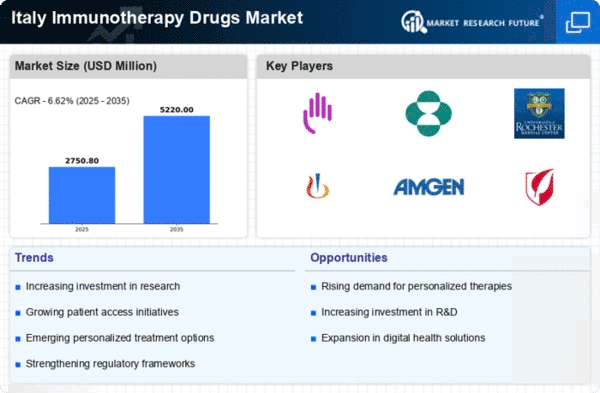Growing Cancer Incidence
The rising incidence of cancer in Italy is a primary driver for the immunotherapy drugs market. According to the Italian Association of Cancer Registries, cancer cases are projected to increase by approximately 1.5% annually. This trend necessitates innovative treatment options, particularly immunotherapies, which have shown promise in improving patient outcomes. The increasing prevalence of various cancers, including melanoma and lung cancer, has led to a heightened demand for effective therapies. As healthcare providers seek to offer cutting-edge treatments, the immunotherapy drugs market is likely to expand significantly. Furthermore, the Italian government has recognized the need for advanced cancer treatments, potentially increasing funding and support for research in this area. This growing focus on cancer treatment is expected to bolster the immunotherapy drugs market, making it a critical component of Italy's healthcare landscape.
Rising Awareness and Education
The rising awareness and education regarding immunotherapy among healthcare professionals and patients are pivotal for the immunotherapy drugs market. Initiatives aimed at educating oncologists and general practitioners about the benefits and applications of immunotherapy are gaining traction in Italy. As more healthcare providers become informed about the potential of immunotherapeutic agents, they are more likely to recommend these treatments to patients. Additionally, patient advocacy groups are playing a crucial role in disseminating information about available therapies, empowering patients to engage in discussions with their healthcare providers. This increased awareness is expected to drive demand for immunotherapy drugs, as patients seek out the latest treatment options. The growing dialogue surrounding immunotherapy is likely to enhance its acceptance and integration into standard cancer care practices in Italy.
Increased Healthcare Expenditure
Italy's increasing healthcare expenditure is a significant driver for the immunotherapy drugs market. The Italian government has committed to enhancing healthcare services, with spending projected to reach approximately €200 billion by 2026. This financial commitment is likely to facilitate the adoption of advanced treatment options, including immunotherapies. As healthcare budgets expand, hospitals and clinics are more inclined to invest in innovative therapies that demonstrate efficacy in treating complex diseases like cancer. The willingness to allocate funds towards cutting-edge treatments indicates a shift towards prioritizing patient-centered care. Consequently, the immunotherapy drugs market stands to benefit from this trend, as healthcare providers seek to incorporate the latest advancements into their treatment protocols, ultimately improving patient outcomes and quality of life.
Supportive Regulatory Environment
A supportive regulatory environment is emerging as a key driver for the immunotherapy drugs market. The Italian Medicines Agency (AIFA) has been proactive in streamlining the approval processes for innovative therapies, including immunotherapies. This regulatory flexibility is designed to expedite patient access to new treatments, fostering a more dynamic market landscape. Additionally, the European Medicines Agency (EMA) has established frameworks that encourage the development and approval of immunotherapeutic agents. As regulatory bodies continue to adapt to the evolving landscape of cancer treatment, the immunotherapy drugs market is likely to experience accelerated growth. The emphasis on patient safety and efficacy, coupled with a commitment to innovation, suggests that the regulatory environment will remain conducive to the advancement of immunotherapy in Italy.
Technological Advancements in Treatment
Technological advancements in the field of immunotherapy are significantly influencing the immunotherapy drugs market. Innovations such as CAR-T cell therapy and checkpoint inhibitors have revolutionized cancer treatment, offering new hope to patients. In Italy, research institutions and pharmaceutical companies are increasingly investing in these technologies, leading to the development of more effective and targeted therapies. The integration of artificial intelligence and machine learning in drug discovery processes is also enhancing the efficiency of developing new immunotherapeutic agents. As these technologies continue to evolve, they are likely to drive the growth of the immunotherapy drugs market, providing healthcare professionals with more tools to combat cancer. The potential for personalized medicine, where treatments are tailored to individual patient profiles, further underscores the importance of these advancements in shaping the future of cancer care in Italy.
















